Items
Search full-text
PPP
-
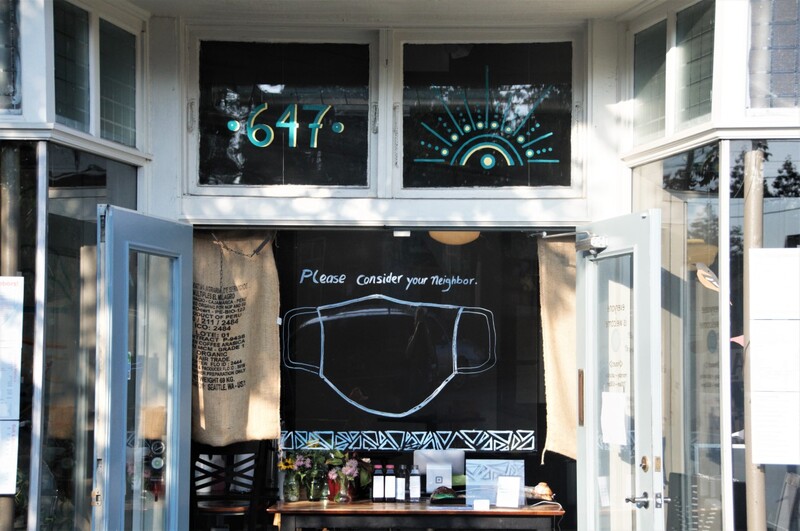 03/19/2021
03/19/2021Jeff Litsey Oral History, 2021/03/19
Jeff Litsey is a resident of the Fountain Square Neighborhood in Indianapolis with his wife and two children. Jeff discusses how the pandemic has affected his family life and schedule while also discussing how the neighborhood dynamics have evolved during the pandemic. Jeff talks about the challenges of running a small, locally owned, coffee shop during the pandemic in the Fletcher Place neighborhood of Indianapolis. This includes revenue, business plan evolution, government assistance, adjusting employee’s hours and pay, and helping employees and customers feel safe during the pandemic. He also illustrates how the neighborhood community helped his employees through tips that rolled into a community employee assistance plan. Additionally, Jeff discusses his anxiety that increased during the pandemic from running a business and worrying about how his shop could affect others and himself. This extended to worrying about his family. He discusses how the hobbies of art, hiking, and birdwatching helped him feel better. The interview ends with his hopes for all people to have healthcare and a home. -
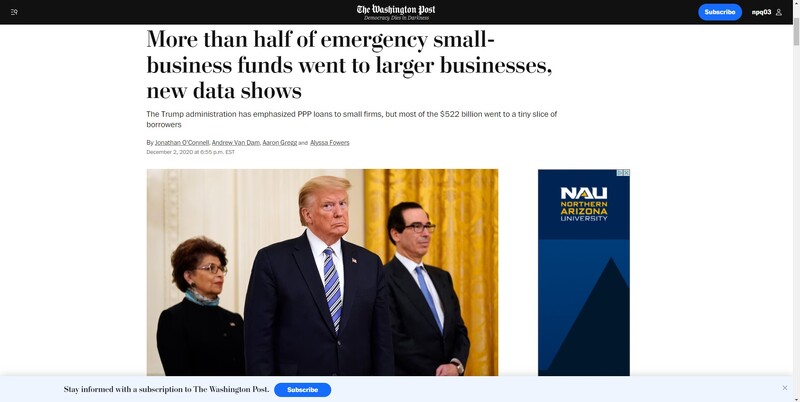 2020-02-24
2020-02-24My Coronavirus Experience
In the beginning of the pandemic, I immediately realized how a large portion of the public was not focused on the virus itself, but the racial controversy of the virus' origin. This was unnerving to the core, because it is a fact that COVID-19 came from China. While it was unacceptable to accept this as fact, MERS literally stands for Middle Eastern Respiratory Syndrome. It is clear that there was a pro-CCP agenda being pushed in the background when propagating the "COVID Safety" spiel. As time went on, more and more inconsistencies began popping up. Beauty and barber shops closed, but Nancy Pelosi is more than welcome to get her hair done. Masks become required to enter any building or participate in society at all, but when the new President was sworn in, the spectators were sitting shoulder-to-shoulder and masks were few and far between. What my story says about the pandemic is that while we may have had a real potential global crisis, I believe things were skewed, twisted, and flipped so that it is most convenient for those who hold the power, and not done in the best interest of the American people. An example of this in real life was how the Los Angeles Lakers, Ritz Carlton, and Bank of America (per store) were able to get PPP loans, drain the pool of PPP money, and leave small business owners fighting for crumbs. I have linked a Washington Post article below that expands on the PPP loan problem and how our government failed small business. The pandemic I fear will have long-lasting, Orwellian effects on our society in the sense that those in power will continue to use fear mongering to control the public through COVID. Even though a vast majority of the population has already had it and are building antibodies, Western European-style, 1940s era vaccination cards are beginning to circulate. I fear these cards will be the new "gold star" or "Scarlet Letter'', except those without it would be barred from society, rather than those with it. In my opinion, COVID today is what AIDS was in the eighties. Lots of unanswered questions, lots of fear, and government intervention so that free thinking is minimized. These three, and you have a perfect recipe for controlling the masses. Both diseases were politicized to death, and public opinion of the disease swung back and forth with politicization. If AIDS was blown up to the proportion that COVID was, I couldn't imagine the backlash the political and science communities would get from a certain demographic of people who are very vocal and have a statistically higher likelihood of contracting HIV. I hypothesize that pandemic would turn into pandemonium. With that, my experience during quarantine was as expected. Mental health suffered due to lack of human interaction and ability to go outside, and physical health suffered due to inability to go outside and lack of motivation which was connected to mental health. The main positive thing from the pandemic I can identify is the performance of my stock portfolio. Even though I lost my job due to COVID, I was still able to afford rent, food, and supplies to stay hunkered down in my new $900/month prison for my three month sentence. Another big positive from the quarantine was my savings. The pandemic helped me realize how much unnecessary or emotional spending I do. It helped me point out lots of bad habits I have so I can work on fixing them. Things like spending money when I'm sad, and identifying vices that hold me back in my day-to-day. While the pandemic brought a lot of negatives to me and the world around me, I believe there are some positive things to take away from it. Opening your mind to more than what the government feeds you, appreciating every moment you have, embracing new hobbies, and learning how to maneuver through change. These are all things the pandemic has taught me, but if I had the option, I wouldn't do it again. In terms of being a part of history, simply by living you are a part of history. I was at Sloan-Kettering in NYC with my family getting a life-extending cancer treatment for my father when 9/11 happened. He was one of three patients that day because while in surgery, the first plane hit the towers. The rest of the patients to be seen that day were canceled. I suppose the point I am trying to make is that history is subjective. 9/11 wasn’t 9/11 to me. 9/11 was the day I was blessed with enough time to make some foundational memories of my father before he passed. It can be argued that since I have been invested in GameStop since November, I was a part of history there too. I went to the Game 7 Cardinals vs. Red Sox World Series Game in Fenway Park. The game that broke the Bambino Curse. Again, it could be argued that I was a part of history there too, except my three year old self was asleep for the last two innings. History is subjective, and every day, everyday people like you and I make history. Historians and memoirists will use these events in the future to write articles, make movies and tv shows, write books, and extrapolate many other kinds of art from it. However, most often historical stories are told through a lens of subjectivity, and because of that, eventually all history becomes skewed to the point where it is indistinguishable from fable. -
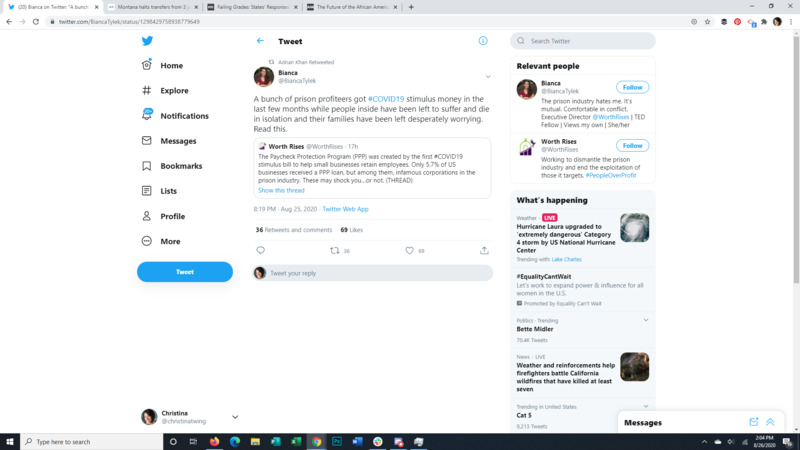 2020-08-25
2020-08-25Did Prisons Benefit from the Paycheck Protection Plan (PPP)?
This Tweet poses a good question for investigation. Did prisons and other incarceration facilities receive PPP loans that were meant for small businesses? -
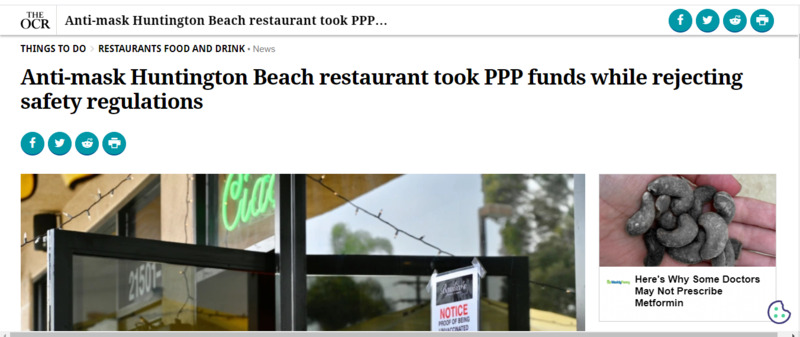 2021-07-29
2021-07-29Basilico’s Pasta e Vino in Huntington Beach
After submitting a restaurant's sign promoting their anti-vax stance I was curious as to whether or not they were still in business. It turns out this restaurant has made quite a buzz in California. They unapologetically promote misinformation and publically prefer their customers to be unvaccinated but happily took thousands in PPP funds. They have spent money on controversial billboards and are not at risk of losing their liquor license. I'm so interested to see where else this story goes. The last sentence of this article sums up the ignorance of the restaurant owner - “Our stand is for all Americans,” wrote Roman. “They can thank us later.” -
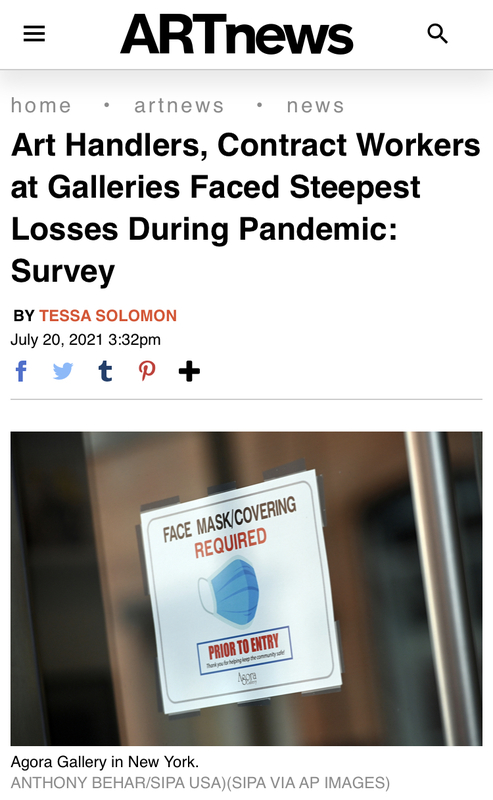 2021-07-20
2021-07-20Art Handlers, Contract Workers at Galleries Faced Steepest Losses During Pandemic: Survey
The ARTnews article uses ADAA (Art Dealers Association of America) data from their official survey to consider the far reaching implications of the pandemic on the art world. Examples of staggering job loss in art handlers and contract workers in particular provide a look into possible changes in the artillery model for the short term while in lockdown. Quantitative data on online art fair participation, and percentages of galleries that received the PPP loan are included as well. -
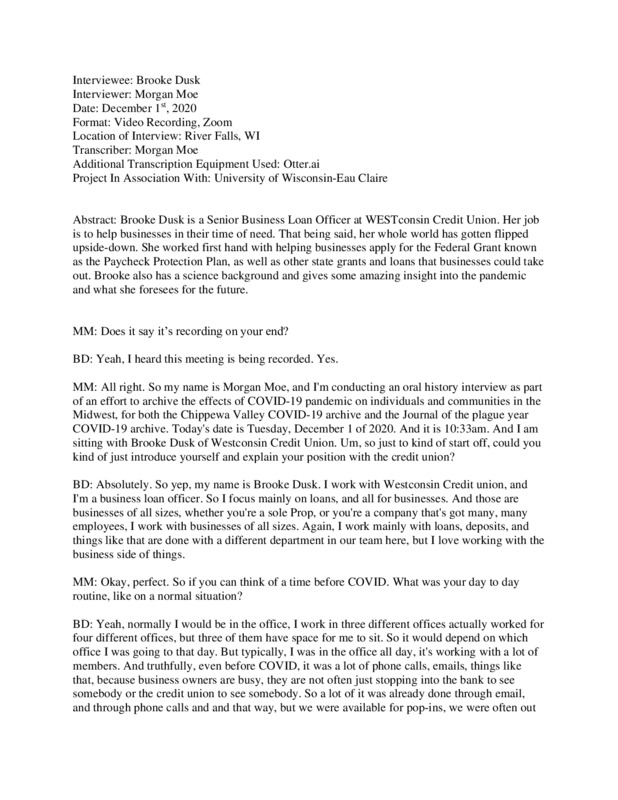 12/01/2020
12/01/2020Brooke Dusk Oral History, 2020/12/01
Brooke Dusk is a Senior Business Loan Officer at WESTconsin Credit Union. Her job is to help businesses in their time of need. That being said, her whole world has gotten flipped upside-down. She worked first hand with helping businesses apply for the Federal Grant known as the Paycheck Protection Plan, as well as other state grants and loans that businesses could take out. Brooke also has a science background and gives some amazing insight into the pandemic and what she foresees for the future. -
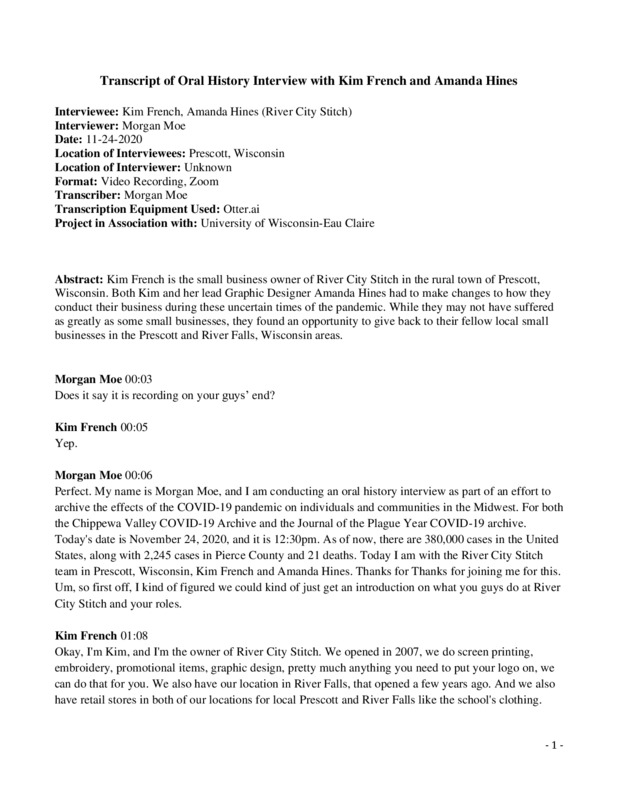 11/24/2020
11/24/2020Kim French and Amanda Hines Oral History, 2020/11/24
Kim French is the small business owner of River City Stitch in the rural town of Prescott, Wisconsin. Both Kim and her lead Graphic Designer Amanda Hines had to make changes to how they conduct their business during these uncertain times of the pandemic. While they may not have suffered as greatly as some small businesses, they found an opportunity to give back to their fellow local small businesses in the Prescott and River Falls, Wisconsin areas. -
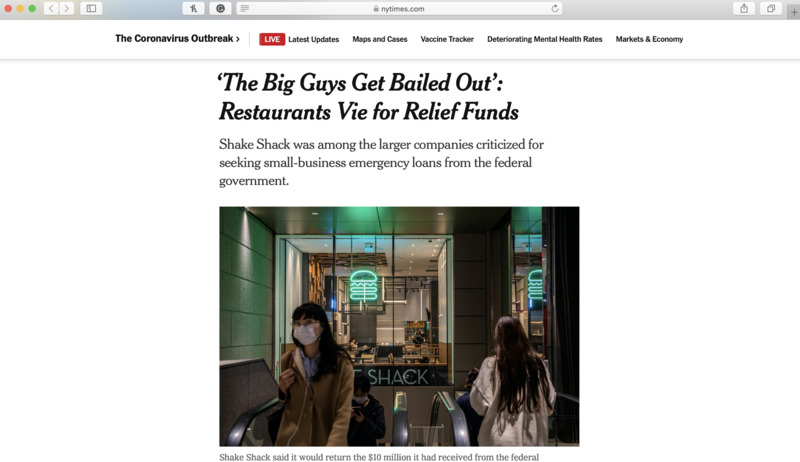 2020-04-20
2020-04-20The Big Boys
In the restaurant world, there are the big boys and the ma-and-pa restaurants. Shake Shack is one of the big boys, founded by Danny Meyer, so why did it receive 10 million dollars of the Small Business Relief Money? Glitches, confusion, and fine print. National Restaurant Association lobbyists fought for a provision that would allow funding to go to chain restaurants with fewer than 500 employees per location. The relief money now exhausted many independent and small restaurant owners were left out while chains got millions. -
 2020-04-12
2020-04-12How things have changed so far
This is just a summary of how me and my family have adjusted to the new conditions created around Covid-19. -
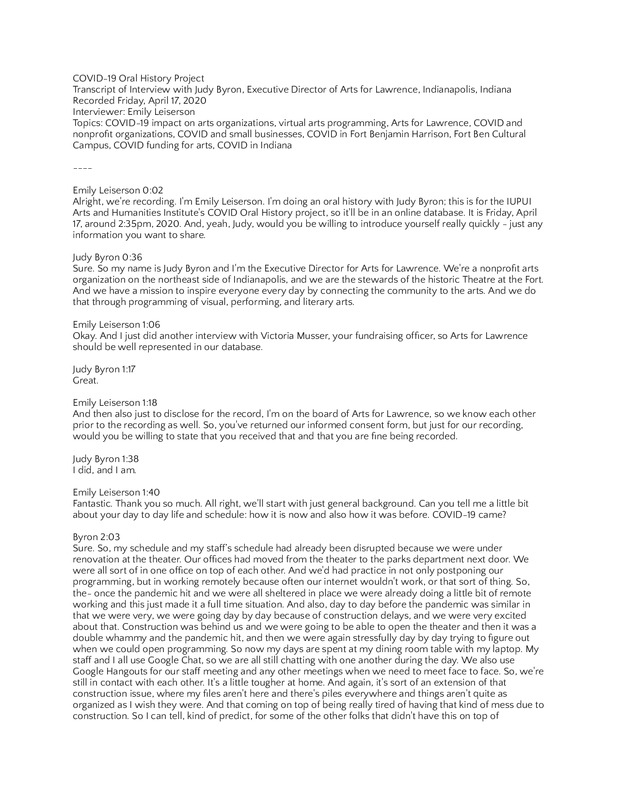 04/17/2020
04/17/2020Judy Byron Oral History, 2020/04/17
-
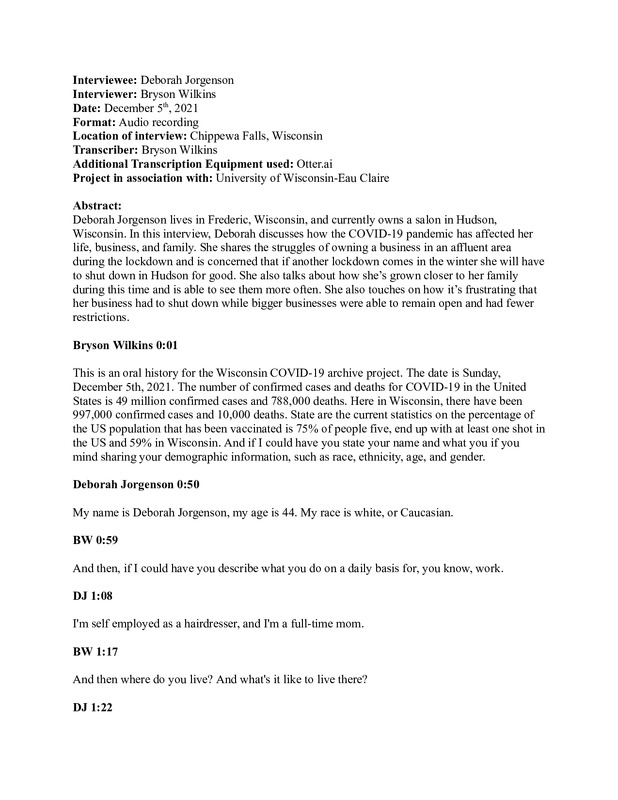 12/05/2021
12/05/2021Deborah Jorgenson Oral History, 2021/12/05
Deborah Jorgenson lives in Frederic, Wisconsin, and currently owns a salon in Hudson, Wisconsin. In this interview, Deborah discusses how the COVID-19 pandemic has affected her life, business, and family. She shares the struggles of owning a business in an affluent area during the lockdown and is concerned that if another lockdown comes in the winter she will have to shut down in Hudson for good. She also talks about how she’s grown closer to her family during this time and is able to see them more often. She also touches on how it’s frustrating that her business had to shut down while bigger businesses were able to remain open and had fewer restrictions. -
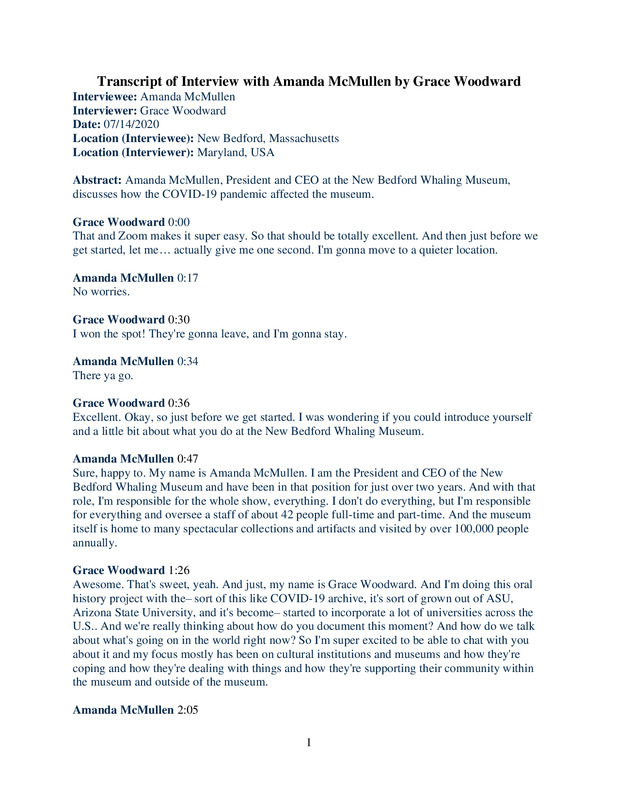 07/14/2020
07/14/2020Amanda McMullen Oral History, 2020/07/14
C19OH -
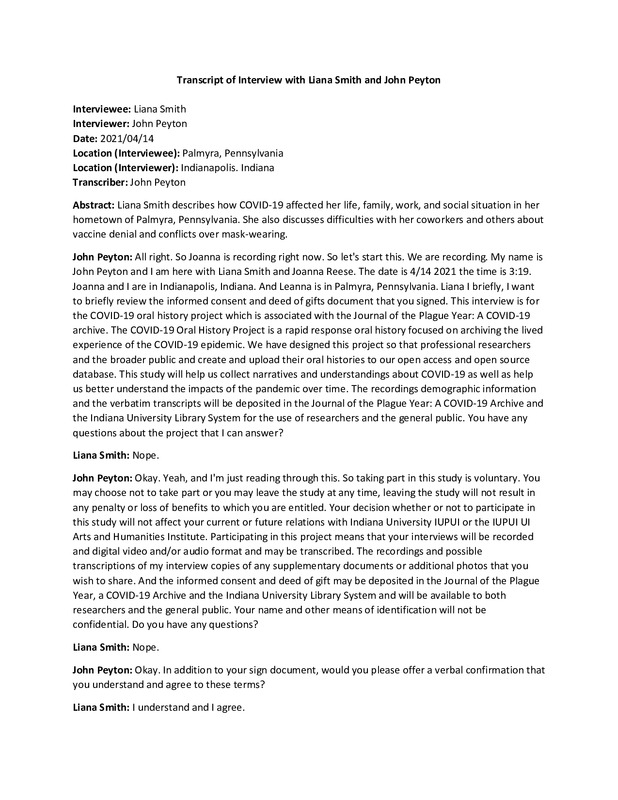 04/14/2021
04/14/2021Liana Smith Oral History, 2021/04/14
-
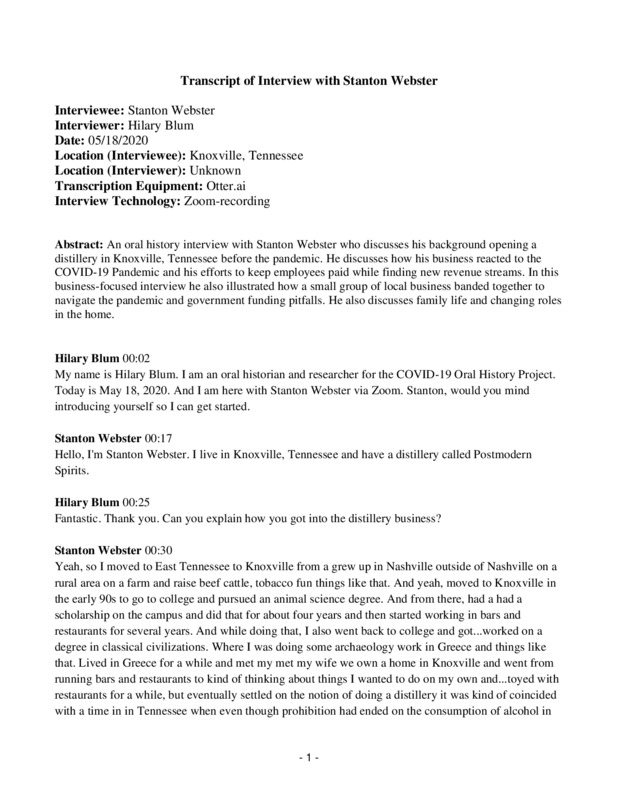 05/18/2020
05/18/2020Stanton Webster Oral History, 2020/05/18
An oral history interview with Stanton Webster who discusses his background opening a distillery in Knoxville, Tennessee before the pandemic. He discusses how his business reacted to the COVID-19 Pandemic and his efforts to keep employees paid while finding new revenue streams. In this business-focused interview he also illustrated how a small group of local business banded together to navigate the pandemic and government funding pitfalls. He also discusses family life and changing roles in the home. -
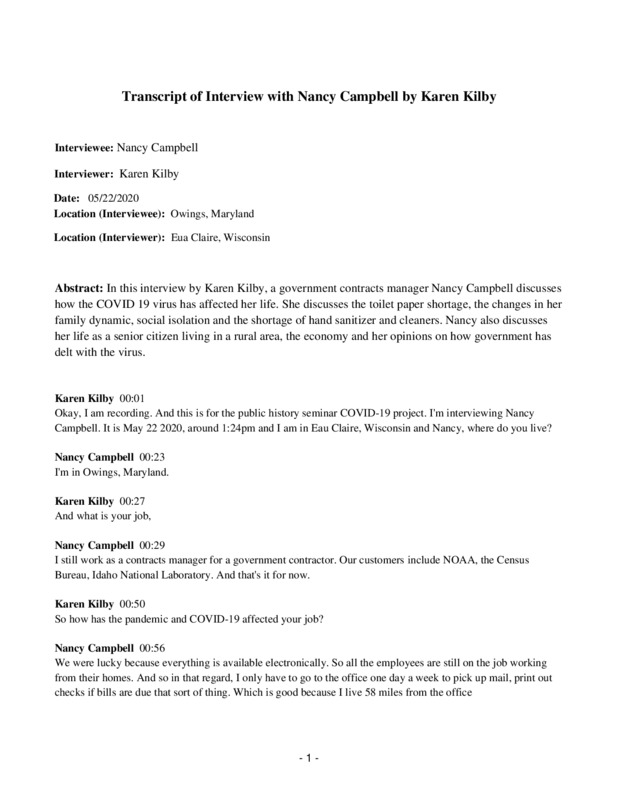 05/22/2020
05/22/2020Nancy Cambell Oral History, 2020/05/22
In this interview by Karen Kilby, a government contracts manager Nancy Campbell discusses how the COVID 19 virus has affected her life. She discusses the toilet paper shortage, the changes in her family dynamic, social isolation and the shortage of hand sanitizer and cleaners. Nancy also discusses her life as a senior citizen living in a rural area, the economy and her opinions on how government has delt with the virus. -
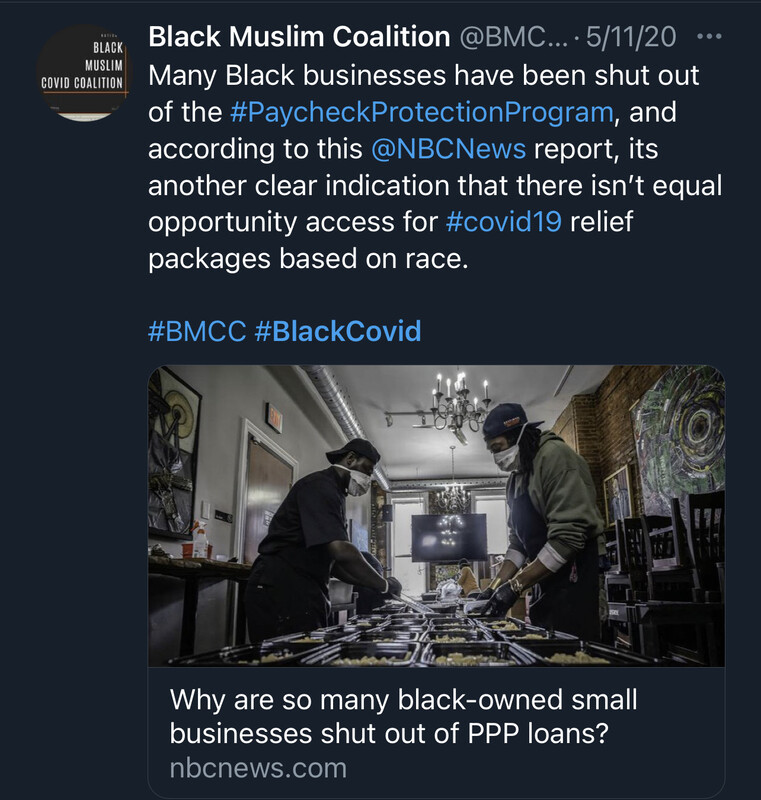 2021-02-22
2021-02-22Black history and the COVID-19 pandemic
Though 60 billion is kept aside by CARES act funding for minority and other underserved borrowers, black-owned businesses are having trouble accessing the government's emergency Paycheck Protection Program loans. The corona virus loan program set 10 million in loans per customers that could be turned in to grants depending on individual profiles. but since its launch much controversy developed as with in minutes funds ran out to well resourced companies. Baltimore cafe owner Terence Dickson reached out to every on he knows as he was on his on last couple hundred to keep the staff paid. He states that the " financial industry has shown me no love for 20 years". He believes that the system should be different. This shows how small black owned businesses have continued to struggle through the pandemic even though the availability of loans and grants are there; but its still unavailable to reach them . -
 2020-11-22
2020-11-22Interview with Brad and Christina Long: Restaurant and Food Industry
The contributor of this item did not include verbal or written consent. We attempted to contact contributor (or interviewee if possible) to get consent, but got no response or had incomplete contact information. We can not allow this interview to be listened to without consent but felt the metadata is important. The recording and transcript are retained by the archive and not public. Should you wish to listen to audio file reach out to the archive and we will attempt to get consent. -
2020-10-03
Eating in Front of a Mirror
Pre-Covid I already lived an isolated life, both physically and due to pervasive anxiety. I would spend weeks pushing myself, go inside the store, talk to three people at yoga, text four people, a million little social tasks that I did to keep my human animal happy. I live in a rural area, work part time at a library, and survive in a sort of genteel poverty. About every three months I'd drive to visit an old friend. Beyond customers at the library and polite friendships with coworkers, that was the only social interaction I really had. Stage one of the pandemic and my workplace closed, we were furloughed. Still paid. And after a single massive shopping trip at the end of March I just stayed home. Really stayed home. I was lucky, I'm already an introvert, have a home on acreage, pets. It wasn't great, but I was comforted knowing so many people were quietly going through the same thing. Then George Floyd was killed and I was called back to work a week later. This was the worst time so far. The building was closed and yet staffed, so we sat surrounded by clorox while people banged on the windows and cursed us. The pointlessness of it, we were only there so our employer could qualify for the PPP money. The anxiety of each coworker potentially being ill. And then, in the lull of work, the many many political opinions of all my white coworkers. I stayed silent, the lone POC, but I can assure you, I now detest them all. This phase ended when my boss got covid an ill-advised vacation to the Gulf. Coming back from our isolation I entered phase 3 of my pandemic. I now hate all my coworkers and view them as existential threats. Due both to their extremely foolish behaviors and their racism. They attend 200 guest count weddings, take discounted flights, and attend funerals. I try to work around them, taking vacation days to avoid them directly after they return. I have moved my desk out of the shared office and directly into the main room of the building. We are fully open again. Masks are not required. It is possible to drive around my small town and see not a single sign of the pandemic. The local diner which has flouted all the mild restrictions since April still has their sign out front, "Our Fried Chicken is to Die For!" I've started to feel mildly insane for still isolating, for still wearing a mask. But I'm also used to having the sole dissenting opinion in the room. For now my plan is to just not get sick, there's no plan if I do get it. I just go home and spend another weekend eating in front of a mirror, and sleeping with a hot water bottle to try and quiet my lonely human animal. -
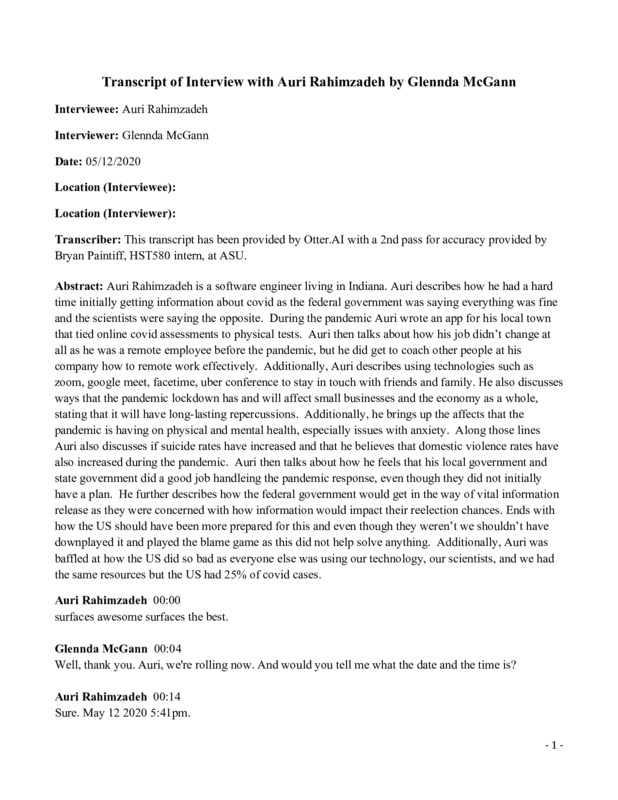 05/12/2020
05/12/2020Auri Rahimzadeh Oral History, 2020/05/12
This is the second interview in a collection by Glennda McGann -
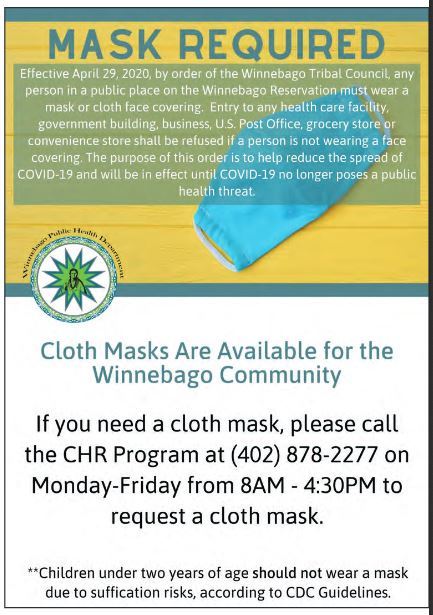 2020-05-02
2020-05-02Amid Pandemic, Winnebago Tribe Prioritizes Resources
“The Winnebago Tribe of Nebraska, like all the other tribes across the na-tion, has been affected by the corona-virus. Social distancing restrictions has caused many changes within the community including the temporary closing of the Winnavegas Casino, the main resource for the Winnebago Tribe of Nebraska. Inevitably, this also forced the tribe to temporary furlough certain tribally funded positions…Unfortunately, the Winnebago Tribe of Nebraska, a government agency, is not eligible for the Paycheck Protection Program (PPP) “a loan designed to pro-vide a direct incentive for small busi-nesses to keep their workers on payroll” (sba.gov). Staying optimistic and proac-tive, the Winnebago Tribe of Nebraska has been taking steps to take care of the tribal members, community and its employees to the best of its ability…The Winnebago Tribe of Nebraska is waiting for a distribution from the US Department of Treasury. The Coronavi-rus Aid, Relief, and Economic Security (CARES) Act was passed by Congress and signed by President Trump which included an $8 billion allocation for all tribes to fund COVID-19 prevention, preparedness and response.”
